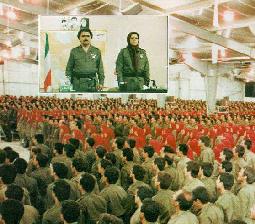It has been more than 15 years since Ibrahim Zakeri taught at the University, yet a professional tone and gesture is still evident in his words. When you ask him a question, he listens attentively, nods and then, in a strong, steady voice, responds with clear-cut phrases which leave his listener with no ambiguities. The conclusion of his speech is always marked with a faint smile.
I met the tall, heavily-built commander, his graying hair slicked back, at the base's planning and operations room. Although his simple olive green uniform does not differ from those of other combatants, Ibrahim Zakeri, in his mid-forties, is one of the top `generals" of the National Liberation Army of Iran and a member of its General Command.
 The
life of Ibrahim Zakeri bears little resemblance to a dull, traditional military
career Before the Shah's dreaded secret police, SAVAK, arrested him in 1973
on charges of affiliation with the People's Mojahedin, Ibrahim Zakeri was
a professor of electrical engineering at Tehran's School of Communications.
He is still an electronics whiz, and much of the Resistance's sophisticated
communications equipment is his invention. After several years of torture
and lengthy periods of solitary confinement, he was eventually freed only
days before the February 1979 anti -monarchic revolution.
The
life of Ibrahim Zakeri bears little resemblance to a dull, traditional military
career Before the Shah's dreaded secret police, SAVAK, arrested him in 1973
on charges of affiliation with the People's Mojahedin, Ibrahim Zakeri was
a professor of electrical engineering at Tehran's School of Communications.
He is still an electronics whiz, and much of the Resistance's sophisticated
communications equipment is his invention. After several years of torture
and lengthy periods of solitary confinement, he was eventually freed only
days before the February 1979 anti -monarchic revolution.
In the first post-revolutionary parliamentary elections, he was the Mojahedin's candidate from Abadan, in the southwestern province of Khuzistan. With the start of the nationwide Resistance in June 1981 Zakeri became a military commander. Later, Massoud Rajavi appointed him commander of the Mojahedin forces in Kurdistan and representative of the National Council of Resistance of Iran in that province.
Ibrahim Zakeri's 60-year-old mother, a sympathizer of the Mojahedin, was slain under torture at Evin prison. His wife was executed.
Go to next page. Go to previous page.